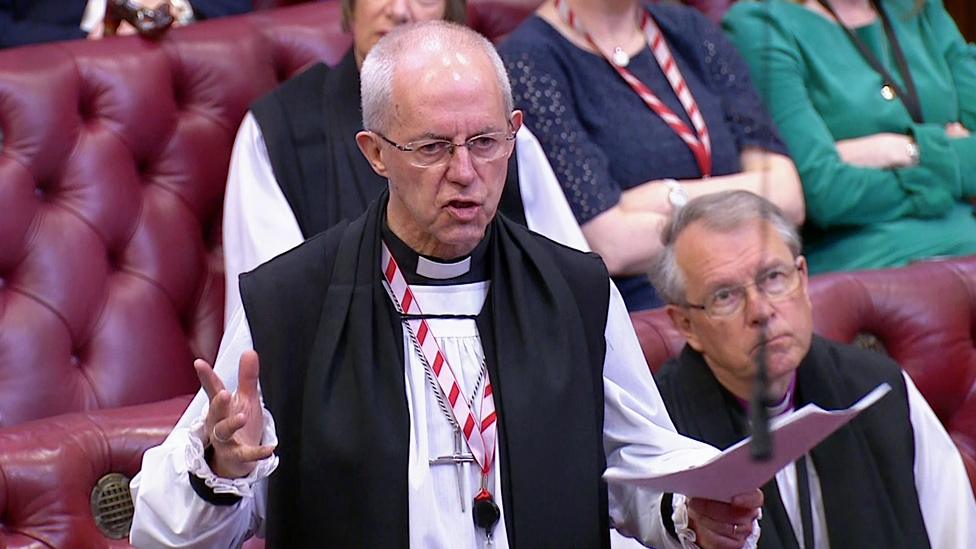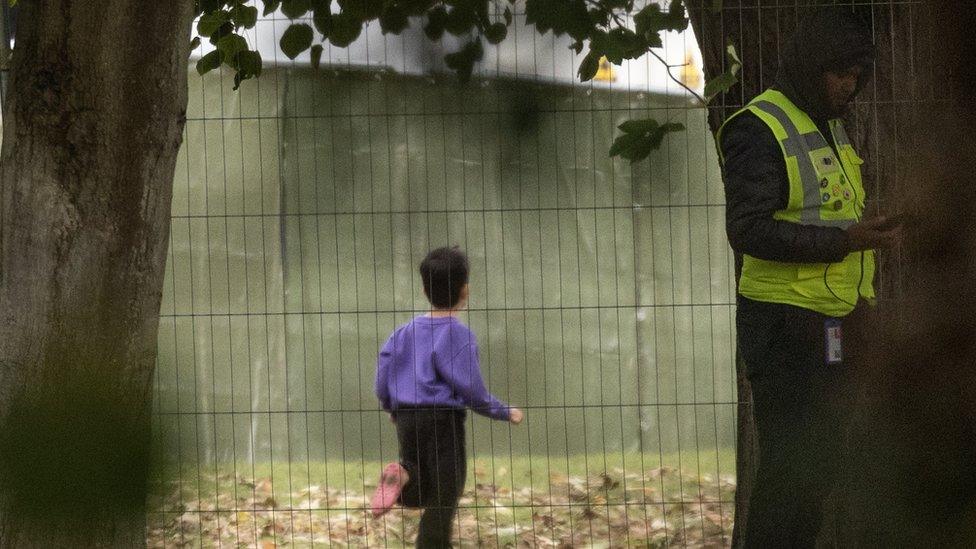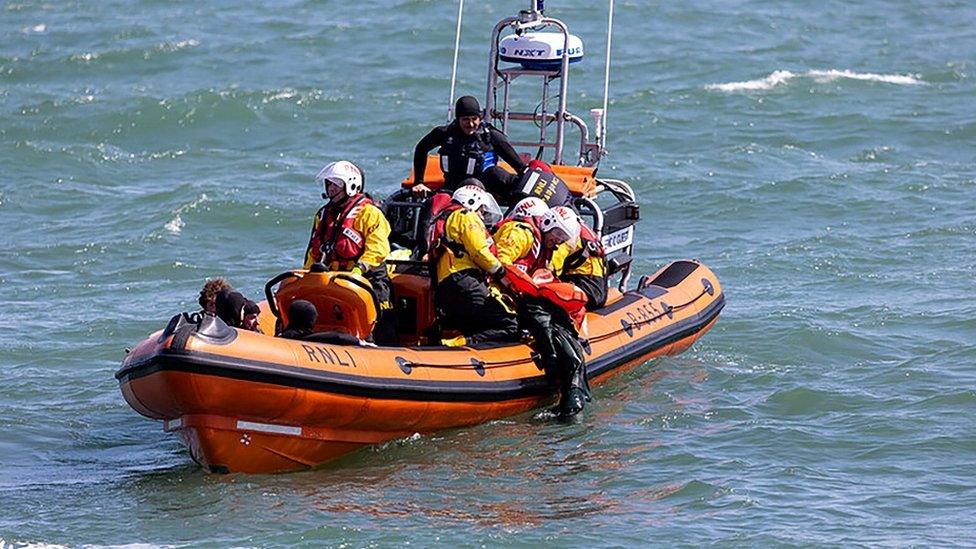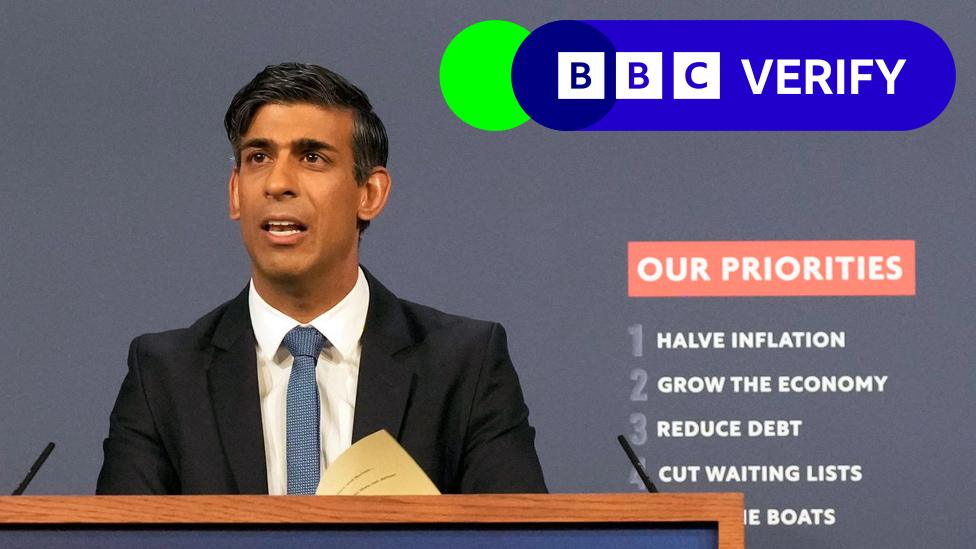Migration Bill: Lords back Archbishop's plan for refugee strategy
- Published

The Archbishop of Canterbury, Justin Welby, has been one of the most vocal critics of the Illegal Migration Bill
The House of Lords has voted to back an attempt to force the government to produce a 10-year strategy on refugees and trafficking, as part of its migration bill.
The Archbishop of Canterbury led the move to include the strategy in the government's flagship legislation to stop small boat crossings to the UK.
Justin Welby insisted the strategy would improve and not damage the bill.
Peers have voted to approve multiple changes to the bill in the Lords.
But ministers are expected to ask MPs to overturn the changes when the legislation returns to the House of Commons, where the Conservative government has a majority.
The bill is central to Prime Minister Rishi Sunak's high-profile pledge to "stop" small boats crossing the English Channel - one of his five key pledges.
The number of migrants crossing from France set a record for June, pushing the total for the year above 11,000.
Earlier, Mr Sunak's spokesman said the government would press ahead with its Illegal Migration Bill, despite the string of defeats it has suffered in the Lords.
Mr Welby has been one of the most vocal critics of the bill, previously condemning the legislation as "morally unacceptable" and "politically impractical".
As peers debated the bill on Wednesday, Mr Welby tabled two amendments which would require the government to have a 10-year strategy for collaborating internationally to tackle refugee crises and human trafficking.
Speaking in the Lords, Mr Welby said the amendment was "intended to be helpful" and mitigate "some of the concerns about a lack of a global and long-term perspective on the issues".
"I urge the government to develop a strategy that is ambitious, collaborative and worthy of our history and up to the scale of the enormous challenges that we face," Mr Welby said.
Peers inflicted further defeats on the government as they debated and voted on detailed changes to the bill. There will be a further day of debate in the Lords before it returns to the Commons.
One amendment would make it a legal duty for ministers to create safe and legal routes to the UK for refugees by next spring. Two others reinstate and expand a right of appeal against age assessments for migrants claiming to be children.
Ahead of Wednesday's debate, the Archbishops of Canterbury and York urged ministers to back changes to the legislation to ensure a "just" and "compassionate" asylum policy.
In a letter to The Times, external signed by eight other faith leaders, the two archbishops warned the legislation "falls short of our obligation to the most vulnerable".
The prime minister's official spokesman said he was not going to respond to individual opinions.
But, he added, Mr Sunak was "clear that stopping the boats, stopping the cruel cycle of vulnerable people being exploited by criminal gangs, is the fair and compassionate thing to do".
'Starting to work'
If passed, the bill would place a legal duty on the government to detain and remove migrants arriving in the UK illegally, either to Rwanda or another "safe" third country.
The government has stressed it remains committed to its plan to remove migrants to Rwanda, and has said it will challenge a Court of Appeal ruling last week that this was unlawful.
On Tuesday, Mr Sunak told the Liaison Committee of senior MPs the government's case would be made in the Supreme Court "confidently and vigorously".
In the first six months of 2023, 11,434 people were detected making the journey from France, according to provisional Home Office figures.
The June total of 3,824 was the highest since records began in 2018. In June last year, 3,140 migrants arrived in the UK after crossing the Channel.
Despite the record June number, the total for the first half of the year was 10% lower than for January-June 2022 (12,747).
In January, Mr Sunak set out five pledges which he said would address "the people's priorities", including passing new laws to stop Channel crossings. But he did not put a timescale on achieving the promise.
Last month, he insisted his plan was "starting to work".
Labour has accused the prime minister of chasing "short-term headlines instead of doing the hard work needed to tackle the problem".
Shadow Home Secretary Yvette Cooper said: "The numbers of dangerous crossings are rising again, hotel costs are spiralling, all while the government's flagship Rwanda policy unravels in front of their eyes."

Sign up for our morning newsletter and get BBC News in your inbox.

- Published3 July 2023

- Published29 June 2023

- Published17 June 2024
